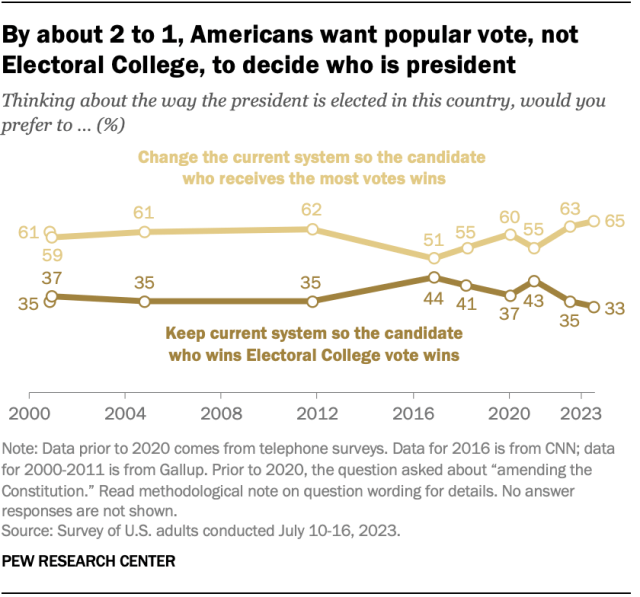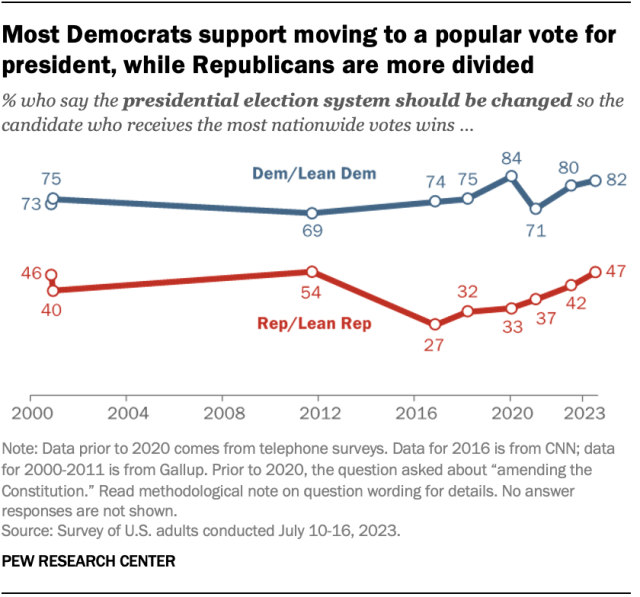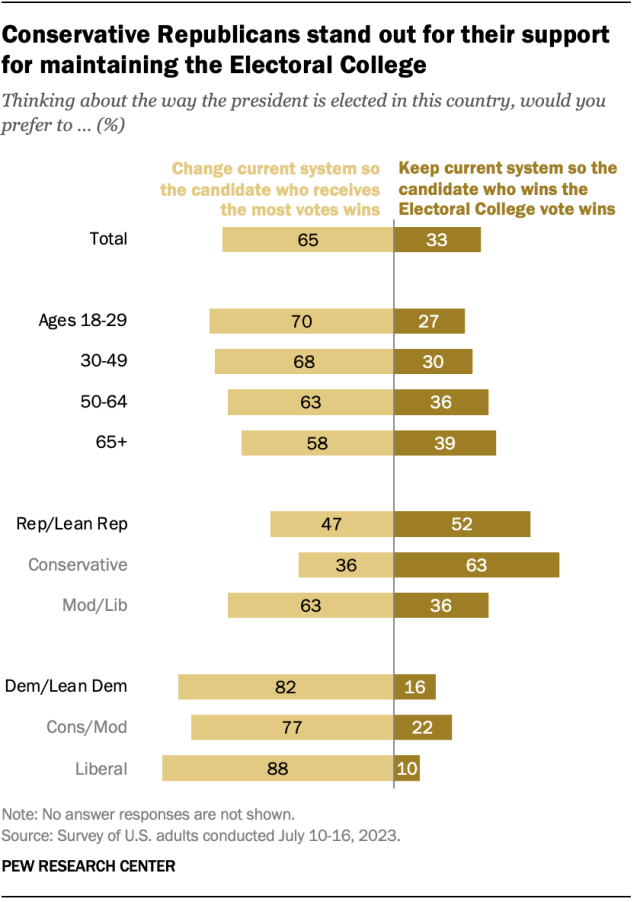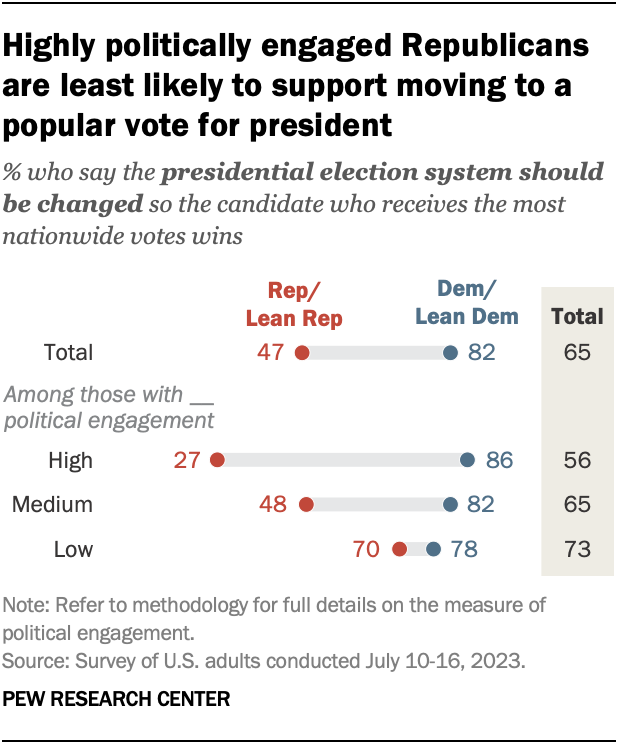In 2000 and 2016, the winners of the popular vote lost their bids for U.S. president after receiving fewer Electoral College votes than their opponents. To continue tracking how the public views the U.S. system for presidential elections, we surveyed 8,480 U.S. adults from July 10 to 16, 2023.
Everyone who took part in the current survey is a member of Pew Research Center’s American Trends Panel (ATP), an online survey panel that is recruited through national, random sampling of residential addresses. This way nearly all U.S. adults have a chance of selection. The survey is weighted to be representative of the U.S. adult population by gender, race, ethnicity, partisan affiliation, education and other categories. Read more about the ATP’s methodology.
Here are the questions used for this analysis, along with responses, and its methodology.
The Electoral College has played an outsize role in some recent U.S. elections. And a majority of Americans would welcome a change to the way presidents are elected, according to a new Pew Research Center survey.

Nearly two-thirds of U.S. adults (65%) say the way the president is elected should be changed so that the winner of the popular vote nationwide wins the presidency. A third favor keeping the current Electoral College system.
Public opinion on this question is essentially unchanged from last year, though Americans’ support for using the popular vote to decide the presidency remains higher than it was a few years ago.
Explore Americans’ views of the political system
This article draws from our major report on Americans’ attitudes about the political system and political representation, conducted July 10-16, 2023. For more, explore:
- The report chapter on Americans’ views of proposed changes to the political system
- The full report
The current electoral system in the United States allows for the possibility that the winner of the popular vote may not secure enough Electoral College votes to win the presidency. This occurred in both the 2000 and 2016 elections, which were won by George W. Bush and Donald Trump, respectively.
Partisan views over time

Democrats and Democratic-leaning independents are far more likely than Republicans and Republican leaners to support moving to a popular vote system for presidential elections (82% vs. 47%).
The share of Democrats saying this is nearly identical to last year but higher than in January 2021, a few weeks before President Joe Biden was sworn into office after winning both the Electoral College and the popular vote.
Republicans are fairly divided on this question: 52% support keeping the current Electoral College system, and 47% support moving to a popular vote system. GOP support for moving to a popular vote is the highest it’s been in recent years – up from 37% in 2021 and just 27% in the days following the 2016 election.
Party and ideology

Nearly nine-in-ten liberal Democrats (88%) and about three-quarters of conservative and moderate Democrats (77%) say they would prefer presidents to be elected based on the popular vote.
Ideological differences are wider among Republicans. A clear majority – 63% – of conservative Republicans prefer keeping the current system, while 36% would change it.
The balance of opinion reverses among moderate and liberal Republicans (who make up a much smaller share of the Republican coalition). A majority of moderate and liberal Republicans (63%) say they would back the country moving to a popular vote for president.
Age
Younger adults are somewhat more supportive of changing the system than older adults. About seven-in-ten Americans under 50 (69%) support this. That share drops to about six-in-ten (58%) among those 65 and older.
Political engagement
Political engagement – being interested in and paying attention to politics – is associated with views about the Electoral College, particularly among Republicans.

Highly politically engaged Republicans overwhelmingly favor keeping the Electoral College: 72% say this, while 27% support moving to a popular vote system.
Republicans with a moderate level of engagement are more divided, with 51% wanting to keep the system as is and 48% wanting to change it. And a clear majority of Republicans with lower levels of political engagement (70%) back moving to a popular vote.
Differences by engagement are much less pronounced among Democrats. About eight-in-ten Democrats with low (78%) and medium (82%) levels of engagement favor changing the system, as do 86% of highly engaged Democrats.
Note: This is an update of posts previously published on Jan. 27, 2021 (written by Bradley Jones, a former senior researcher), and Aug. 5, 2022 (written by Jocelyn Kiley and Rebecca Salzer, a former intern). Here are the questions used for this analysis, along with responses, and its methodology.
In January 2020, Pew Research Center ran a survey experiment that asked this question in two slightly different ways. One used the language that we and other organizations had used in prior years, with the reform option asking about “amending the Constitution so the candidate who receives the most votes nationwide wins the election.” The other version asked about “changing the system so the candidate who receives the most votes nationwide wins the election.” The January 2020 survey revealed no substantive differences between asking about “amending the Constitution” and “changing the system.”
We conducted this experiment in large part because reforming the way presidents are selected does not technically require amending the Constitution. The National Popular Vote Interstate Compact, for example, could theoretically accomplish it without a constitutional amendment. Since there was no substantive difference in the survey results between the two question wordings, we have adopted the revised wording.
